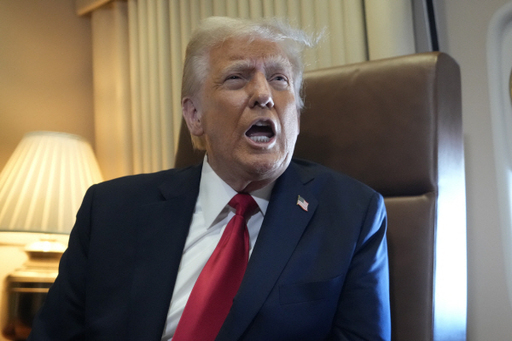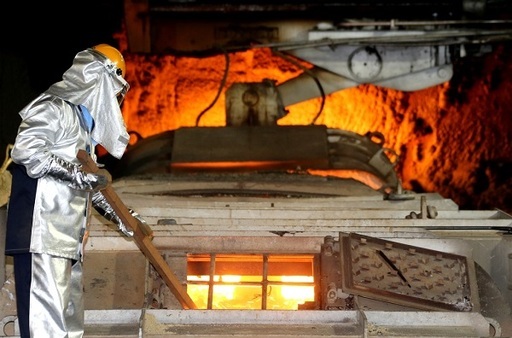


President Donald Trump has announced plans to impose a 25% tariff on all steel and aluminum imported into the United States, causing both the steel industry and the government to work on countermeasures. The industry, already struggling due to China's aggressive pricing and weak demand, is now facing even greater challenges. If the "tariff bomb" is implemented, the industry is expected to experience a triple blow, worsening profitability.
According to the industry on the 10th, President Trump is gradually expanding the "trade war" that started with China to the rest of the world. On the 9th, President Trump stated, "Any steel entering the U.S. will be subject to a 25% tariff." He also announced that aluminum will be subjected to the same tariff rate.
The tariffs on steel and aluminum were mentioned by President Trump when he signed an executive order at the White House on January 31st. At that time, he announced that tariffs on steel and aluminum would be imposed within months, along with those on semiconductors and pharmaceuticals, but the timing has been moved up sooner than expected. If President Trump signs the executive order imposing a 25% tariff on steel and aluminum products as previously stated, it is expected that the Korean steel industry will inevitably face a blow.
The U.S. steel market reaches 100 million tons annually, with domestic production at 80 million tons. Imports exceed 20 million tons, with Korean steel accounting for about 2.6 million tons.
During his first term, President Trump applied Section 232 of the Trade Expansion Act to impose a 25% tariff on steel products and a 10% tariff on aluminum products, citing national security reasons. At that time, South Korea negotiated with the U.S. and, in exchange for exemption from the steel tariffs, agreed to a quota system that limits export volumes.
Currently, the steel industry is closely monitoring the U.S. administration's announcement of specific executive orders. With the ongoing challenges from China's low-cost competition, the addition of U.S. tariffs could potentially worsen the situation even further.

The industry has been considering local production as a way to minimize risks, but it is expected that it will take considerable time before this becomes a reality. Hyundai Steel is reviewing the construction of a steel mill in the U.S. to produce automotive steel plates and other products. During its earnings conference call last month, Hyundai Steel stated, "We are actively considering establishing a steel mill in the U.S." and added, "We will make it public once a decision on investment is made."
POSCO continues to focus on investments in future businesses, such as the development of hydrogen reduction steelmaking (HyREX) technology. POSCO Group also mentioned in a conference call earlier this month regarding entry into the U.S. market, saying, "The investment costs are high and the situation is volatile," but added, "We are carefully reviewing various options."
The government is closely monitoring the U.S. move to impose tariffs on steel and aluminum. An emergency inspection meeting was held at the Seoul Steel Association at 3:30 PM, with Deputy Trade Minister Park Jong-won presiding, and attended by officials from the Steel Association and key export companies.
Deputy Minister Park emphasized, "The government is mobilizing all available networks, including our embassy in the U.S., to gather specific information." He added, "We will closely coordinate with the industry to actively respond and minimize the impact on our companies."
The industry has reached a consensus to share the information gathered so far through both the association and individual export companies, and to respond closely as one team, with both the public and private sectors working together.
A steel industry official stated, "Since there is a quota system in place, it is difficult to predict what decision will be made regarding South Korea." He added, "We are preparing various scenarios for each company while waiting for the precise executive order from the Trump administration." He further commented, "If tariffs are imposed, some quantities will go to U.S. steel companies, but even if U.S. steel companies adjust their plant utilization rates, the amount they can absorb will be limited."
ChatGPT를 사용하여 번역한 기사입니다.


 Copyright ⓒ 메트로신문 & metroseoul.co.kr
Copyright ⓒ 메트로신문 & metroseoul.co.kr
Copyright ⓒ Metro. All rights reserved. (주)메트로미디어의 모든 기사 또는 컨텐츠에 대한 무단 전재ㆍ복사ㆍ배포를 금합니다.
주식회사 메트로미디어 · 서울특별시 종로구 자하문로17길 18 ㅣ Tel : 02. 721. 9800 / Fax : 02. 730. 2882
문의메일 : webmaster@metroseoul.co.kr ㅣ 대표이사 · 발행인 · 편집인 : 이장규 ㅣ 신문사업 등록번호 : 서울, 가00206
인터넷신문 등록번호 : 서울, 아02546 ㅣ 등록일 : 2013년 3월 20일 ㅣ 제호 : 메트로신문
사업자등록번호 : 242-88-00131 ISSN : 2635-9219 ㅣ 청소년 보호책임자 및 고충처리인 : 안대성